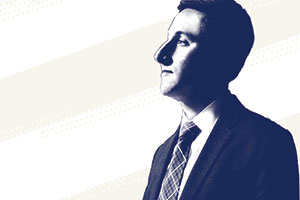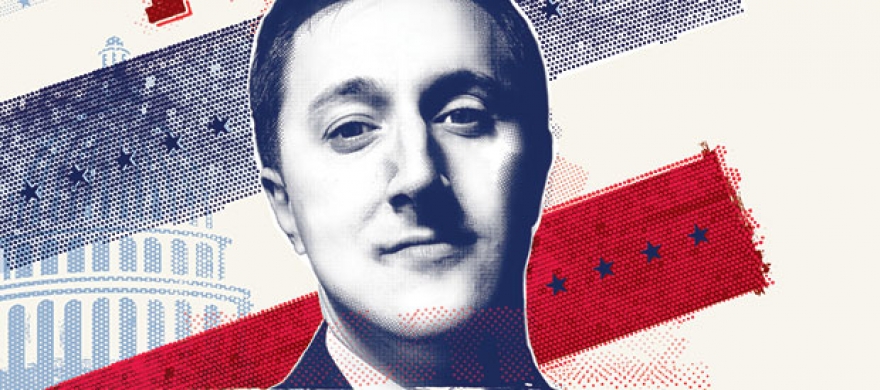Office Politics
An election law expert shares his take on American politics and the 2016 presidential race.
Derek Muller was in the midst of earning his law degree from the University of Notre Dame when he found himself fascinated by the rapidly growing area of election law. Excited to be in front of this field, he focused his research on federalism and the role of states in federal elections. Now, nearly a decade later, his passion for the political process drives his frequent contributions to national news media, opinion pieces, and scholarly articles that analyze election law.
An associate professor of law at the Pepperdine University School of Law, Muller teaches
in the areas of civil procedure, complex civil litigation, and evidence, as well as
election law. During this year’s particularly polarizing and contentious election
climate, his expertise provided students with a behind-the-scenes look at American
politics.
Pepperdine Magazine sat down with Muller to discuss federal laws, the American political system, and
the 2016 presidential election.
Pepperdine Magazine: What do you find most fascinating about politics and federalism?
Derek Muller: I am most interested in the process behind elections. There is always going to be
a winner and a loser, and people will get excited or disappointed from time to time.
But we have this set of rules that is supposed to govern the process neutrally and
fairly in all circumstances. Studying those rules before the big contest, or the fight
about who is going to win or lose, fascinates me.
We have a unique government system in the United States where the state and federal
powers often overlap. So, we vote for the president and for members of Congress, but
those elections are largely administered at the state level. This system of federalism
means big national issues are regulated at the state level, which creates complexity.
PM: Is there anything about politics or elections in general that you wish people understood?
DM: I think a lot of times people get really upset with the process. Any time something
goes wrong in an election, we tend to blame a conspiracy or voter suppression or an
effort to thwart the will of the people. In reality, many things that happen in our
elections are being administered by people of good faith who do want the right outcome
in these disputes, but may have some disagreements about what the end ought to be.
Sometimes there are bad actors, but many times these are people acting in good faith.
Sometimes there is a disconnect between what people want to happen and the process
behind how it happens, and thinking that they always have to line up. But that might
not always be the case. At the local level, it’s usually community volunteers who
are helping at the polls or county clerks who are setting up the polling stations.
These are low-level officials who are doing their best to administer how we vote and
how we go about the political process.
PM: What do you want people to know about the 2016 presidential election?
DM: People need to be aware that presidential elections are the ones that get the most
media attention, but there are many things on the ballot that are fairly significant,
especially at the local level.
In California, residents voted on 17 ballot initiatives. Those were opportunities
to change the law, in some ways pretty dramatically. That’s something that people
need to keep in mind—that there are many things to be voting for and it takes a lot
of work to think about those things in advance and come up with your own decisions
about what ought to happen.
Don’t get lost in the presidential election that everyone might be talking about.
Instead, also focus on some of the other issues that might affect you much more directly
in the long run.
PM: Has anything about this current election surprised you?
DM: There were many instances where people projected some potential catastrophes that
could happen in terms of changing election laws, voting hours, polling places, and
registration. Additionally, there was a lot of worry that the presidential primaries—which
typically shake out in such a way that results in many questioning their legitimacy—
would be closely decided or deeply divisive, and that the conventions would play out
the same way.
We’ve had a relatively ordinary process, even if a lot of people might not be happy
with the outcome. That’s sometimes just what happens in elections. There have certainly
been some hiccups along the way, but nothing that has been so catastrophic that it’s
been insurmountable. PM: What should government officials be aware of during elections?
PM: What should government officials be aware of during elections?
DM: People should recognize that the rules politicians and citizens come up with affect
the outcome of votes. For example, regulating which groups are allowed to vote in
primaries, when the elections are going to be held—and in what order—for presidential
primaries, and deciding how many candidates can appear on the ballot all have dramatic
consequences at the end of the day.
Therefore, election officials and government agencies need to be very careful in thinking
through the potential consequences of these decisions to avoid the suggested notion
that the outcome may not have necessarily been what people wanted.
PM: Which of your scholarly works or political contributions are you most proud of?
DM: A few years ago I started writing about the procedures to challenge President Obama’s
eligibility. focused on who can bring these lawsuits in court, and whether or not they are able to bring
these lawsuits the first place. It also suggested that candidate litigations were a relatively new problem and would
happen again in the near future.
Sure enough, here we are in 2016 and have seen the same kind of dispute over Ted Cruz’s
eligibility for the presidency. It’s less about determining whether somebody is a
natural-born citizen and more about the procedures that should or should not be in
place, if the decision to remove a candidate from the ballot should be in the hands
of voters or courts, and whether a citizen can bring litigation to federal or state
court.
These sound like picky details that might affect only a few lawyers who care about
these things, but setting up these rules can dramatically impact whether a candidate
appears on the ballot. I’m pleased with work that focuses on trying to think about
the best ways to design a fair election system that provides the greatest opportunity
to voters while at the same time maintaining the integrity of our process.
PM: How has Pepperdine influenced your work?
DM: It’s exciting to be at a place where I’m able to pursue this area of research and
for it to have a broad impact in the legal community and in the public policy sphere.
The opportunity to flourish here has been really valuable.
It’s always great to speak to my colleagues about my work and get their feedback because
in the field of law—despite the fact that it might not be your niche area—you are
generally able to understand legal arguments and some of the concepts that are at
play, and to challenge and tease out the issues. I’ve had a lot of support from colleagues
here to sharpen my writing and my arguments.
PM: Would you ever run for office?
DM: I don’t think so. There is an off chance I might run for a local type of office,
but it’s not really in my blood to be a politician. I’m much more of a policy wonk,
thinking about what the laws ought to look like and maybe advising lawmakers about
how they would go about changing that, rather than being the politician myself.
